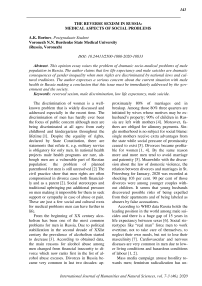The reverse sexism in Russia: medical aspects of social problems
Автор: Borisov A.K.
Журнал: Международный журнал гуманитарных и естественных наук @intjournal
Рубрика: Особое мнение
Статья в выпуске: 7-3 (46), 2020 года.
Бесплатный доступ
This opinion essay raises the problem of dramatic socio-medical problems of male population in Russia. The author claims that low life expectancy and male suicides are dramatic consequences of gender inequality when men rights are discriminated by national laws and cultural traditions. The author expresses a serious concern about the current situation with male health in Russia making a conclusion that this issue must be immediately addressed by the government and the society.
Reversed sexism, male discrimination, low life expectancy, male suicide
Короткий адрес: https://sciup.org/170187981
IDR: 170187981 | DOI: 10.24411/2500-1000-2020-10833
Текст научной статьи The reverse sexism in Russia: medical aspects of social problems
The discrimination of women is a well-known problem that is widely discussed and addressed especially in the recent time. The discrimination of men has hardly ever been the focus of public concern although men are being discriminated at all ages: from early childhood and kindergartens throughout the lifetime [1]. Despite the equality of rights, declared by State Constitution, there are statements that refute it, e.g. military service is obligatory for only men. In national health projects male health programs are rare, although men are a vulnerable part of Russian population: the problem of planned parenthood for men is still unresolved [2] The civil practice show that men rights are often compromised in divorce cases both financially and as a parent [2]. Social stereotypes and traditional upbringing put additional pressure on men making it impossible for them to seek support or sympathy in case of abuse or pain. These are just a few social and cultural roots for medical problems men can have further in life.
From the beginning of XX century alcoholism has been one of the most common problems for men in Russia. Due to political stabilization in the second decade of XXIst century the prevalence of alcoholism started to decrease [3]. According to obtained data, the main reasons for alcohol abuse among men changed from financial insecurity to divorce which now ranks first in the list of alcohol abuse excuses. Divorces in Russia became very common in last two decades: ap- proximately 80% of marriages end in breakup. Among those 80% three quarters are initiated by wives whose motives may be exhusband’s property; 90% of children in Russia are left with mothers [4]. Moreover, fathers are obliged for alimony payments. Single motherhood is no subject for social blame: single mothers receive extra advantages from the state while social pressure of promiscuity ceased to exist [5]. Divorces became profitable for women [1, 4]. By the same reason more and more men tend to avoid marriage and paternity [5]. Meanwhile with the discussion about the law of domestic violence, the relation between divorces and marriages in St. Petersburg for January, 2020 was recorded at shocking 103 per cent. 90 per cent of those divorces were among younger couples without children. It seems that young husbands discovered possible risks of being expelled from their apartments and of being labeled as abusers by false accusations.
According to WHO data Russia holds the leading position in the world among male suicides and there is a huge gap of 15 years in life expectancy between sexes [6]. Social stereotypes like “real man” force men to work overtime, not to take care of themselves, to neglect their own needs, but not to lose their masculinity [7]. Cardiovascular and nervous diseases are very common in men due to lower living conditions and hazardous conditions of labour [1, 2].
Mass media campaign arouse hostility towards men; feminism radicalization has un- leashed the war of sexes. If nothing is done, it may worsen the situation in social sphere especially in demographics and pose a threat to the very existence of the nation.
To sum up, current situation clearly demonstrates that physical and mental health of the male population in Russia is directly associated with the social problem men encounter as well as with traditional cultural burden placed on men. Unless this discriminative attitude to men start changing, the whole existence of the nation, of which men comprise a half, is under threat.
Список литературы The reverse sexism in Russia: medical aspects of social problems
- Stolyarov D.V. Qualitative sociological methodology in the context of the study of discrimination of men. 4th Industrial Revolution: Realities and challenges. Conference materials. St. Petersburg. 2018. P. 826- 828. In Russian
- Karmayeva T.N. Infringement of the rights of men in Russia. 74th conference "Scientific issues of the agricultural complex". Conference materials. Krasnodar. 2019. P. 1195-1196. In Russian.
- Moskalenko V.D. Medical Outcomes of alcoholism and narcomany. Narcologia. 2007.Vol. 7 (67). P. 66-69. In Russian.
- Chekulaev S.S., Zamulina E.E. The issue of delimitation of legal differentiation and gender discrimination in Russian family law. Sinergiya nauk. 2018. Vol. 19. P. 1281-1288. In Russian.
- Torosyan R.A. The Right for maternity capital: problems of ensuring equality of men and women. 6th Conference "Social inequality: a new reality for scientific studies". Conference materials. Saratov. 2018. P. 243-246. In Russian.
- Cockerham W. The intersection of life expectancy and gender in a transitional state: the case of Russia. Sociology of health and illness. 2012. Vol. 34 (6). P. 943-957.
- Kakitelashvili M.M. About Discrimination of the Gender Principle. Zakony Rossii. 2016. Vol. 6. P. 95-99. In Russian


